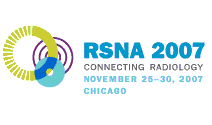
Abstract Archives of the RSNA, 2007
SSC09-05
Identification of an Image-based Molecular Biomarker That Predicts Treatment Response to an Anti-angiogenic Therapy for Treatment of Advanced Hepatocellular Carcinoma
Scientific Papers
Presented on November 26, 2007
Presented as part of SSC09: Gastrointestinal (CT/MR Perfusion: Liver)
 Research and Education Foundation Support
Research and Education Foundation Support
Michael D. Kuo MD, Presenter: Nothing to Disclose
Anand K.H. Singh MD, Abstract Co-Author: Nothing to Disclose
Alvin C. Silva MD, Abstract Co-Author: Nothing to Disclose
Amy Kiyo Hara MD, Abstract Co-Author: License agreement, General Electric Company
Dushyant V. Sahani MD, Abstract Co-Author: Researcher, General Electric Company
Consultant, Bracco Group
We have previously demonstrated that dynamic CT imaging traits efficiently encode the global gene expression programs of hepatocellular carcinoma (HCC) and can thus potentially provide a rich source of image-based molecular biomarkers. In this study we sought to determine whether we could predict treatment response in patients with advanced HCC treated with a targeted anti-VEGF therapy based on these HCC imaging-genomic associations.
Pre-treatment CT scans of 25 patients enrolled in a phase II clinical trial for treatment of advanced HCC with a targeted VEGF inhibitor were evaluated. Scans were read by two blinded radiologists, in consensus, across CT imaging traits previously demonstrated to correlate with the different VEGF A, B and C isoforms as well as a different set of imaging traits (presence of internal arteries and hypodense halos) correlated with an HCC venous invasion gene expression program. The primary endpoint was objective response based on RECIST criteria at four weeks or greater post enrollment.
A positive treatment response was seen in 5/25 patients. Expression levels of VEGF A, B or C, based on imaging-genomic associations, were not predictive of response (p=0.9) suggesting that tumoral VEGF levels do not correlate with treatment response against their cognate inhibitor. However, activation status of the venous invasion gene expression program based on imaging was predictive of treatment response (p=0.05). Tumors demonstrating imaging traits associated with activation of the venous invasion program did not respond to anti-VEGF therapy, whereas tumors with downregulation of this program did respond (specificity=1).
Using a radiogenomics approach we identified an image based molecular biomarker associated with activation of a venous invasion gene expression program that predicted treatment response to a VEGF inhibitor in a phase II clinical trial. Tumors associated with activation of this gene expression program do not appear to respond whereas their counterparts do.
Global imaging-genomic association maps can provide a rich source of imaging biomarkers in HCC and may potentially be used to guide patient selection for molecular-targeted therapies.
Kuo, M,
Singh, A,
Silva, A,
Hara, A,
Sahani, D,
Identification of an Image-based Molecular Biomarker That Predicts Treatment Response to an Anti-angiogenic Therapy for Treatment of Advanced Hepatocellular Carcinoma. Radiological Society of North America 2007 Scientific Assembly and Annual Meeting, November 25 - November 30, 2007 ,Chicago IL.
http://archive.rsna.org/2007/5008062.html


 Research and Education Foundation Support
Research and Education Foundation Support